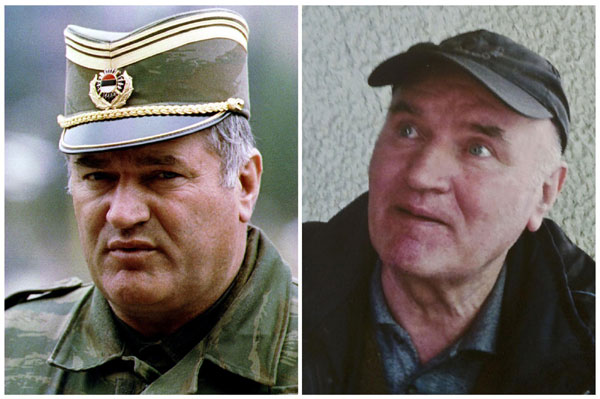Global General
Mladic could be extradited for war crimes
(Agencies)
Updated: 2011-05-28 08:13
 |
Large Medium Small |
 |
|
Combination photo shows Bosnian Serb army commander General Radko Mladic in Pale dated May 7, 1993 and in Belgrade after he was arrested on May 26, 2011. [Photo/Agencies] |
BELGRADE, Serbia - Ratko Mladic is eating strawberries and receiving family visits in a Serbian jail, but as early as Monday the ex-general could be on his way to face a war-crimes tribunal in The Hague, possibly joining his former ally Radovan Karadzic on trial for some of the worst horrors of the Balkan wars.
|
||||
Now a disheveled old man, his family claim he's too ill to stand up to the rigors of a genocide trial and that he's not guilty of crimes including his alleged role in the worst atrocity in Europe since World War II, the massacre that left 8,000 Muslim men and boys in the Srebrenica enclave in Bosnia dead.
Serbia's war crimes court ruled that the 69-year-old is fit to stand trial and that conditions have been met for him to be handed over to the UN tribunal. A defense lawyer said Mladic would appeal the decision on Monday. The former fugitive could be extradited within hours if that appeal is rejected.
His defense is demanding that an "independent medical commission" examine Mladic - preferably one from Russia, a historical friend of the Serbs. Instead the government dispatched the health minister, a former friend, who deemed him stable.
Serbian war crimes prosecutors argue that the defense was simply trying to delay the extradition, and the tribunal promises it is capable of dealing with any health problems.
Mladic was in command of the Bosnian Serb army during the country's 1992-95 war, which left more than 100,000 people dead and drove another 1.8 million from their homes. Thousands of Muslims and Croats were slain, tortured or expelled in a campaign to purge the region of non-Serbs.
Mladic's ruthlessness was legendary: "Burn their brains!" he once bellowed as his men pounded Sarajevo with artillery fire. So was his opinion of himself: He nicknamed himself "God," and kept goats which he was said to have named after Western leaders he despised.
He eluded the net of war crimes investigators for years after his 1995 indictment by the UN war crimes court on charges of genocide, war crimes and crimes against humanity - until going out into his garden for a pre-dawn walk.
New details emerged Friday of the raid, revealing it was more of a shot in the dark than a pinpoint operation. Police had been conducting similar operations throughout Serbia for years.
Two dozen masked, black-clad members of a team of special police had no specific intelligence that Mladic was inside a relative's yellow brick house in Lazarevo, a village they were visiting for the first time.
Speaking on condition of anonymity because of the sensitivity of the information, Serbian police officials said that Mladic identified himself immediately after his arrest, handing over two pistols that he was carrying without a fight.
"Good work," Mladic told the officers, according to Serbian police chief Ivica Dacic. "You found the one you were looking for."
A police photo of Mladic showed him looking hollow-cheeked and shrunken after a decade and a half on the run, a far cry from the beefy commander he once was. The photo taken moments after his arrest in a tiny northern Serbian village shows a clean-shaven Mladic with thinning hair and wearing a navy blue baseball hat. He looks up with wide eyes, as if in surprise.
| 分享按钮 |

